Nursing Assignment: The Impact of COVID-19 on Senior Living Residents
VerifiedAdded on 2022/09/17
|8
|1773
|13
Essay
AI Summary
This assignment examines the multifaceted impact of the COVID-19 pandemic on senior living residents, focusing on the increased health risks, social isolation, and ageism experienced by this vulnerable population. It highlights the higher mortality rates among seniors with co-morbidities, ethical dilemmas in healthcare decision-making, and the consequences of social isolation on mental and physical health. The paper also addresses the rise of ageist sentiments and discrimination, along with government responses and recommendations for improving care, including the use of online technologies for social support and combating loneliness. The conclusion emphasizes the need to respect the rights of the elderly and maintain social support through various means.
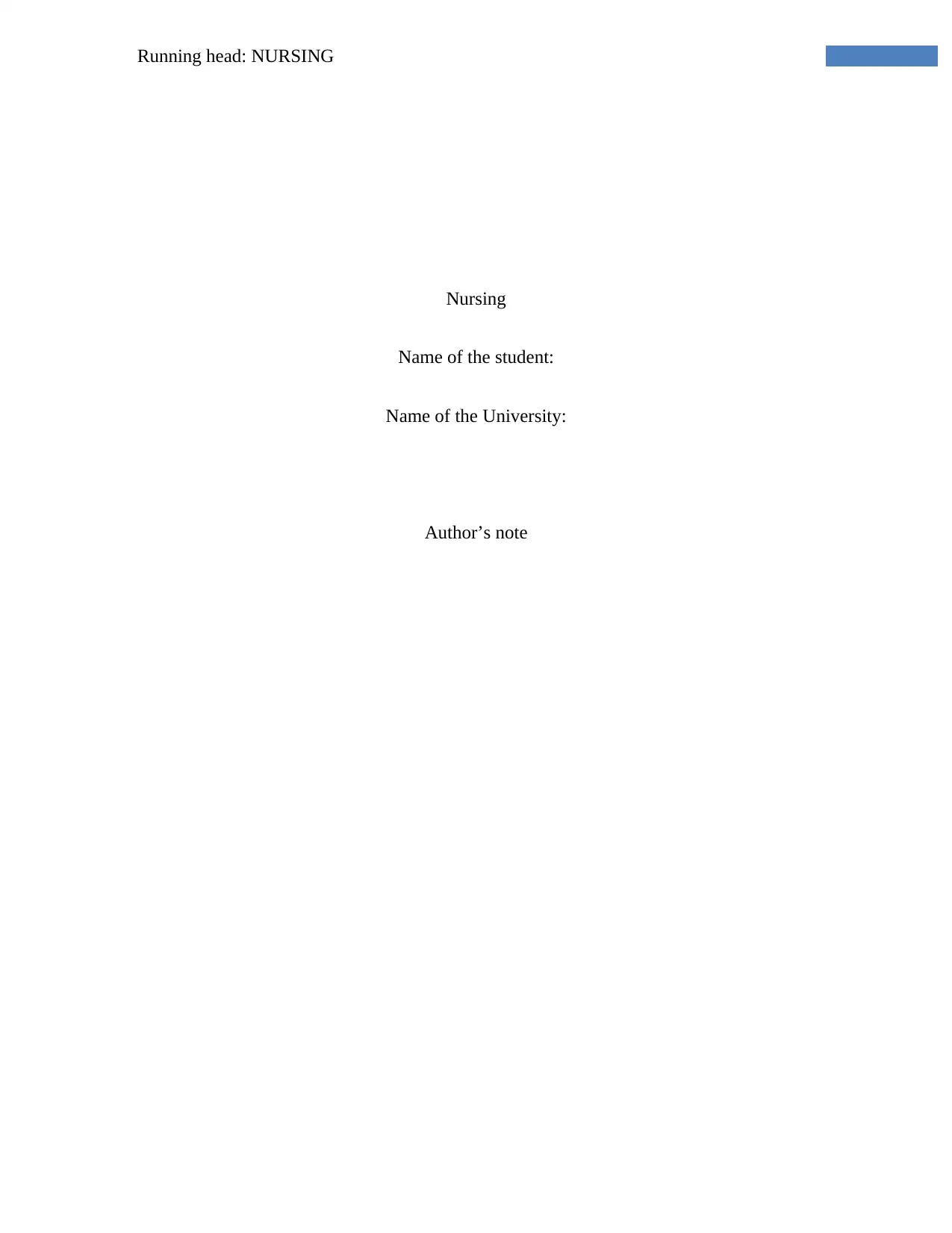
Running head: NURSING
Nursing
Name of the student:
Name of the University:
Author’s note
Nursing
Name of the student:
Name of the University:
Author’s note
Paraphrase This Document
Need a fresh take? Get an instant paraphrase of this document with our AI Paraphraser
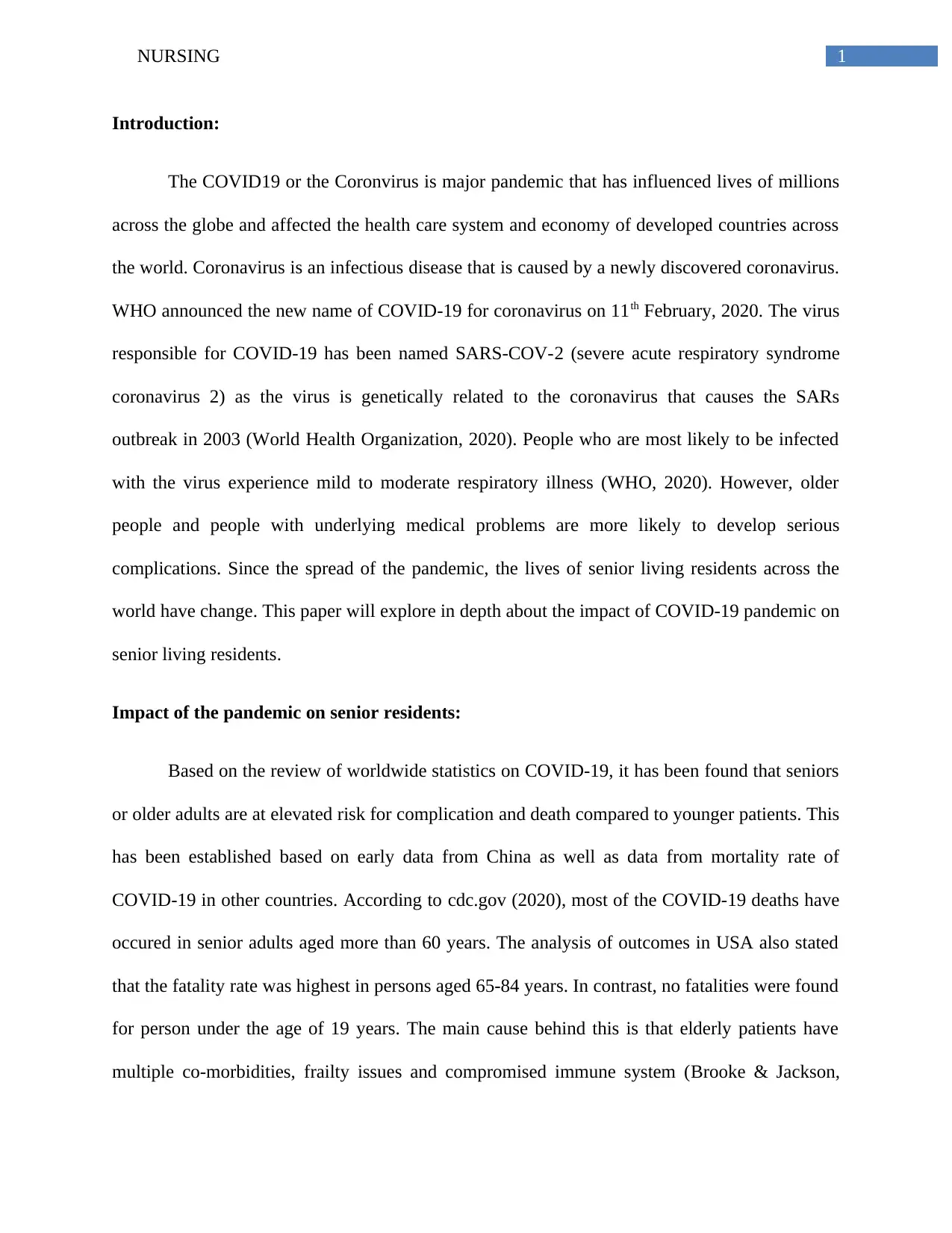
1NURSING
Introduction:
The COVID19 or the Coronvirus is major pandemic that has influenced lives of millions
across the globe and affected the health care system and economy of developed countries across
the world. Coronavirus is an infectious disease that is caused by a newly discovered coronavirus.
WHO announced the new name of COVID-19 for coronavirus on 11th February, 2020. The virus
responsible for COVID-19 has been named SARS-COV-2 (severe acute respiratory syndrome
coronavirus 2) as the virus is genetically related to the coronavirus that causes the SARs
outbreak in 2003 (World Health Organization, 2020). People who are most likely to be infected
with the virus experience mild to moderate respiratory illness (WHO, 2020). However, older
people and people with underlying medical problems are more likely to develop serious
complications. Since the spread of the pandemic, the lives of senior living residents across the
world have change. This paper will explore in depth about the impact of COVID-19 pandemic on
senior living residents.
Impact of the pandemic on senior residents:
Based on the review of worldwide statistics on COVID-19, it has been found that seniors
or older adults are at elevated risk for complication and death compared to younger patients. This
has been established based on early data from China as well as data from mortality rate of
COVID-19 in other countries. According to cdc.gov (2020), most of the COVID-19 deaths have
occured in senior adults aged more than 60 years. The analysis of outcomes in USA also stated
that the fatality rate was highest in persons aged 65-84 years. In contrast, no fatalities were found
for person under the age of 19 years. The main cause behind this is that elderly patients have
multiple co-morbidities, frailty issues and compromised immune system (Brooke & Jackson,
Introduction:
The COVID19 or the Coronvirus is major pandemic that has influenced lives of millions
across the globe and affected the health care system and economy of developed countries across
the world. Coronavirus is an infectious disease that is caused by a newly discovered coronavirus.
WHO announced the new name of COVID-19 for coronavirus on 11th February, 2020. The virus
responsible for COVID-19 has been named SARS-COV-2 (severe acute respiratory syndrome
coronavirus 2) as the virus is genetically related to the coronavirus that causes the SARs
outbreak in 2003 (World Health Organization, 2020). People who are most likely to be infected
with the virus experience mild to moderate respiratory illness (WHO, 2020). However, older
people and people with underlying medical problems are more likely to develop serious
complications. Since the spread of the pandemic, the lives of senior living residents across the
world have change. This paper will explore in depth about the impact of COVID-19 pandemic on
senior living residents.
Impact of the pandemic on senior residents:
Based on the review of worldwide statistics on COVID-19, it has been found that seniors
or older adults are at elevated risk for complication and death compared to younger patients. This
has been established based on early data from China as well as data from mortality rate of
COVID-19 in other countries. According to cdc.gov (2020), most of the COVID-19 deaths have
occured in senior adults aged more than 60 years. The analysis of outcomes in USA also stated
that the fatality rate was highest in persons aged 65-84 years. In contrast, no fatalities were found
for person under the age of 19 years. The main cause behind this is that elderly patients have
multiple co-morbidities, frailty issues and compromised immune system (Brooke & Jackson,
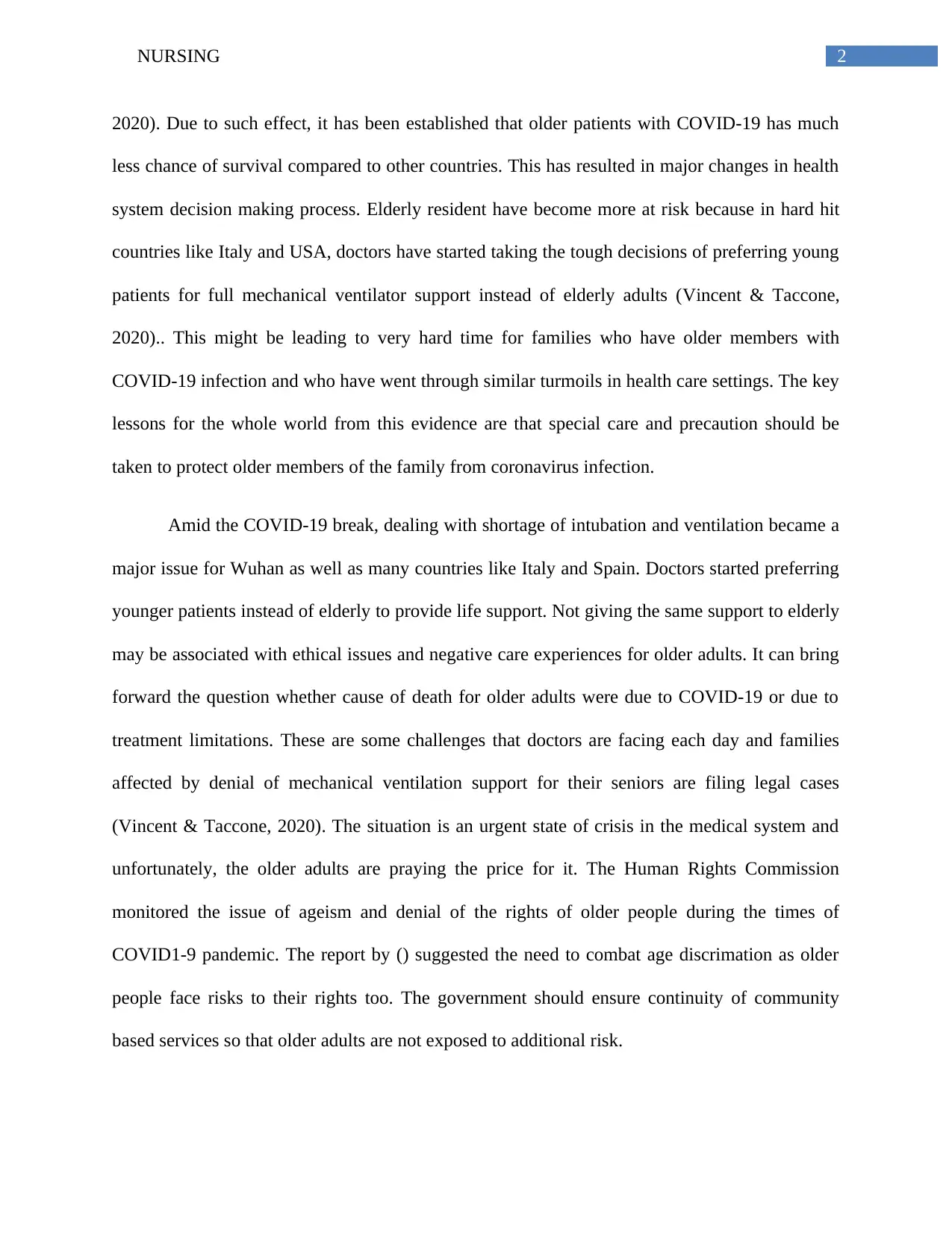
2NURSING
2020). Due to such effect, it has been established that older patients with COVID-19 has much
less chance of survival compared to other countries. This has resulted in major changes in health
system decision making process. Elderly resident have become more at risk because in hard hit
countries like Italy and USA, doctors have started taking the tough decisions of preferring young
patients for full mechanical ventilator support instead of elderly adults (Vincent & Taccone,
2020).. This might be leading to very hard time for families who have older members with
COVID-19 infection and who have went through similar turmoils in health care settings. The key
lessons for the whole world from this evidence are that special care and precaution should be
taken to protect older members of the family from coronavirus infection.
Amid the COVID-19 break, dealing with shortage of intubation and ventilation became a
major issue for Wuhan as well as many countries like Italy and Spain. Doctors started preferring
younger patients instead of elderly to provide life support. Not giving the same support to elderly
may be associated with ethical issues and negative care experiences for older adults. It can bring
forward the question whether cause of death for older adults were due to COVID-19 or due to
treatment limitations. These are some challenges that doctors are facing each day and families
affected by denial of mechanical ventilation support for their seniors are filing legal cases
(Vincent & Taccone, 2020). The situation is an urgent state of crisis in the medical system and
unfortunately, the older adults are praying the price for it. The Human Rights Commission
monitored the issue of ageism and denial of the rights of older people during the times of
COVID1-9 pandemic. The report by () suggested the need to combat age discrimation as older
people face risks to their rights too. The government should ensure continuity of community
based services so that older adults are not exposed to additional risk.
2020). Due to such effect, it has been established that older patients with COVID-19 has much
less chance of survival compared to other countries. This has resulted in major changes in health
system decision making process. Elderly resident have become more at risk because in hard hit
countries like Italy and USA, doctors have started taking the tough decisions of preferring young
patients for full mechanical ventilator support instead of elderly adults (Vincent & Taccone,
2020).. This might be leading to very hard time for families who have older members with
COVID-19 infection and who have went through similar turmoils in health care settings. The key
lessons for the whole world from this evidence are that special care and precaution should be
taken to protect older members of the family from coronavirus infection.
Amid the COVID-19 break, dealing with shortage of intubation and ventilation became a
major issue for Wuhan as well as many countries like Italy and Spain. Doctors started preferring
younger patients instead of elderly to provide life support. Not giving the same support to elderly
may be associated with ethical issues and negative care experiences for older adults. It can bring
forward the question whether cause of death for older adults were due to COVID-19 or due to
treatment limitations. These are some challenges that doctors are facing each day and families
affected by denial of mechanical ventilation support for their seniors are filing legal cases
(Vincent & Taccone, 2020). The situation is an urgent state of crisis in the medical system and
unfortunately, the older adults are praying the price for it. The Human Rights Commission
monitored the issue of ageism and denial of the rights of older people during the times of
COVID1-9 pandemic. The report by () suggested the need to combat age discrimation as older
people face risks to their rights too. The government should ensure continuity of community
based services so that older adults are not exposed to additional risk.
⊘ This is a preview!⊘
Do you want full access?
Subscribe today to unlock all pages.

Trusted by 1+ million students worldwide
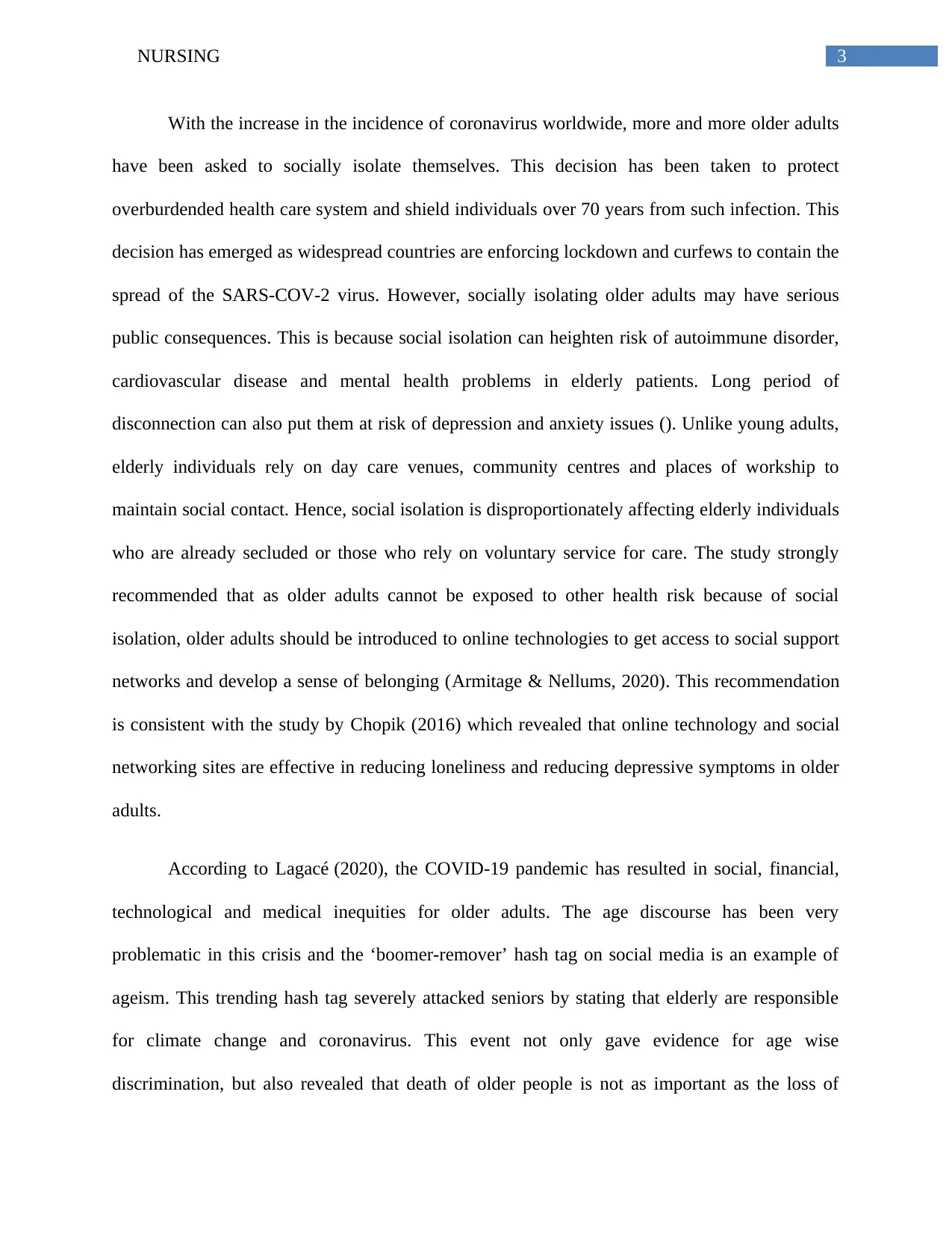
3NURSING
With the increase in the incidence of coronavirus worldwide, more and more older adults
have been asked to socially isolate themselves. This decision has been taken to protect
overburdended health care system and shield individuals over 70 years from such infection. This
decision has emerged as widespread countries are enforcing lockdown and curfews to contain the
spread of the SARS-COV-2 virus. However, socially isolating older adults may have serious
public consequences. This is because social isolation can heighten risk of autoimmune disorder,
cardiovascular disease and mental health problems in elderly patients. Long period of
disconnection can also put them at risk of depression and anxiety issues (). Unlike young adults,
elderly individuals rely on day care venues, community centres and places of workship to
maintain social contact. Hence, social isolation is disproportionately affecting elderly individuals
who are already secluded or those who rely on voluntary service for care. The study strongly
recommended that as older adults cannot be exposed to other health risk because of social
isolation, older adults should be introduced to online technologies to get access to social support
networks and develop a sense of belonging (Armitage & Nellums, 2020). This recommendation
is consistent with the study by Chopik (2016) which revealed that online technology and social
networking sites are effective in reducing loneliness and reducing depressive symptoms in older
adults.
According to Lagacé (2020), the COVID-19 pandemic has resulted in social, financial,
technological and medical inequities for older adults. The age discourse has been very
problematic in this crisis and the ‘boomer-remover’ hash tag on social media is an example of
ageism. This trending hash tag severely attacked seniors by stating that elderly are responsible
for climate change and coronavirus. This event not only gave evidence for age wise
discrimination, but also revealed that death of older people is not as important as the loss of
With the increase in the incidence of coronavirus worldwide, more and more older adults
have been asked to socially isolate themselves. This decision has been taken to protect
overburdended health care system and shield individuals over 70 years from such infection. This
decision has emerged as widespread countries are enforcing lockdown and curfews to contain the
spread of the SARS-COV-2 virus. However, socially isolating older adults may have serious
public consequences. This is because social isolation can heighten risk of autoimmune disorder,
cardiovascular disease and mental health problems in elderly patients. Long period of
disconnection can also put them at risk of depression and anxiety issues (). Unlike young adults,
elderly individuals rely on day care venues, community centres and places of workship to
maintain social contact. Hence, social isolation is disproportionately affecting elderly individuals
who are already secluded or those who rely on voluntary service for care. The study strongly
recommended that as older adults cannot be exposed to other health risk because of social
isolation, older adults should be introduced to online technologies to get access to social support
networks and develop a sense of belonging (Armitage & Nellums, 2020). This recommendation
is consistent with the study by Chopik (2016) which revealed that online technology and social
networking sites are effective in reducing loneliness and reducing depressive symptoms in older
adults.
According to Lagacé (2020), the COVID-19 pandemic has resulted in social, financial,
technological and medical inequities for older adults. The age discourse has been very
problematic in this crisis and the ‘boomer-remover’ hash tag on social media is an example of
ageism. This trending hash tag severely attacked seniors by stating that elderly are responsible
for climate change and coronavirus. This event not only gave evidence for age wise
discrimination, but also revealed that death of older people is not as important as the loss of
Paraphrase This Document
Need a fresh take? Get an instant paraphrase of this document with our AI Paraphraser
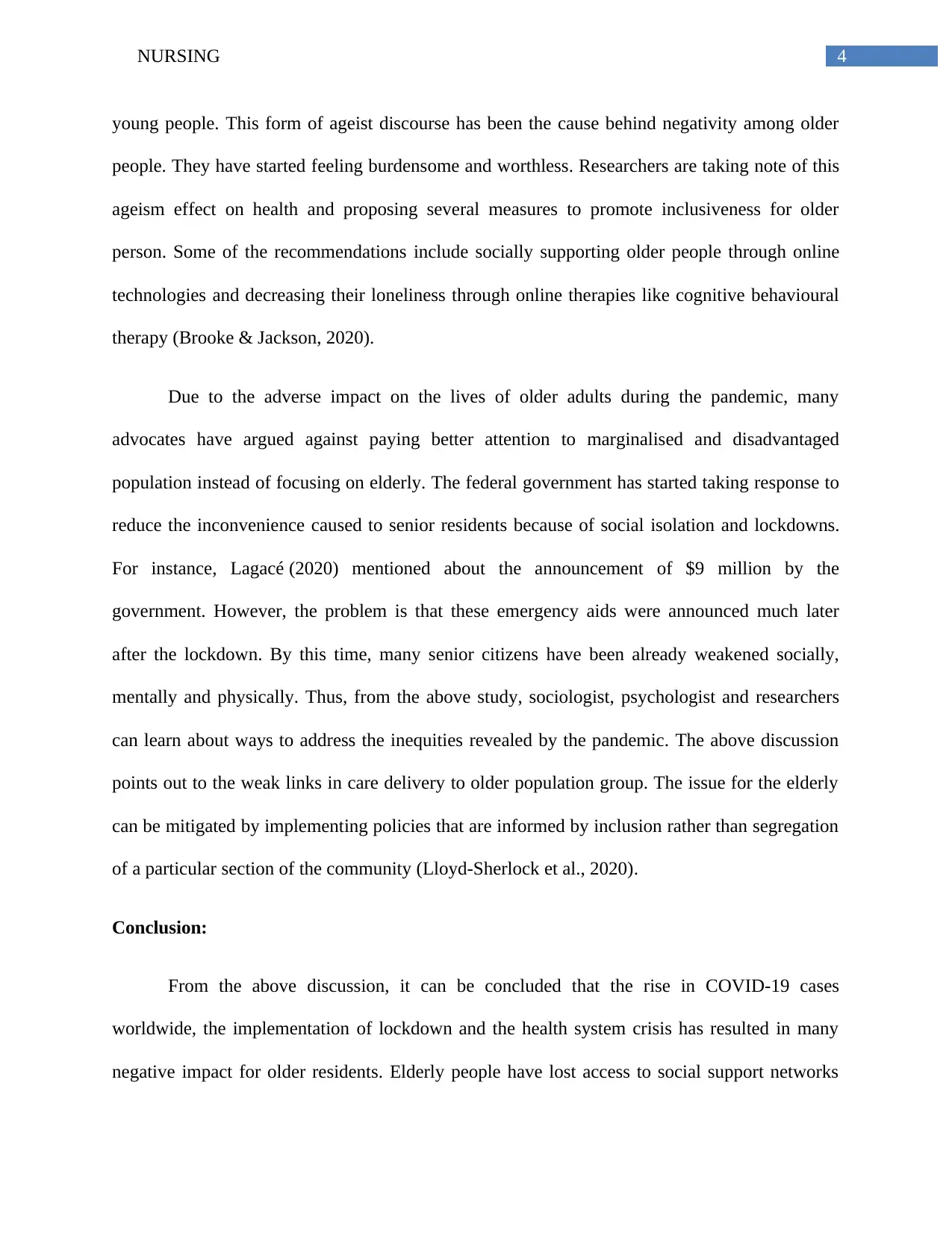
4NURSING
young people. This form of ageist discourse has been the cause behind negativity among older
people. They have started feeling burdensome and worthless. Researchers are taking note of this
ageism effect on health and proposing several measures to promote inclusiveness for older
person. Some of the recommendations include socially supporting older people through online
technologies and decreasing their loneliness through online therapies like cognitive behavioural
therapy (Brooke & Jackson, 2020).
Due to the adverse impact on the lives of older adults during the pandemic, many
advocates have argued against paying better attention to marginalised and disadvantaged
population instead of focusing on elderly. The federal government has started taking response to
reduce the inconvenience caused to senior residents because of social isolation and lockdowns.
For instance, Lagacé (2020) mentioned about the announcement of $9 million by the
government. However, the problem is that these emergency aids were announced much later
after the lockdown. By this time, many senior citizens have been already weakened socially,
mentally and physically. Thus, from the above study, sociologist, psychologist and researchers
can learn about ways to address the inequities revealed by the pandemic. The above discussion
points out to the weak links in care delivery to older population group. The issue for the elderly
can be mitigated by implementing policies that are informed by inclusion rather than segregation
of a particular section of the community (Lloyd-Sherlock et al., 2020).
Conclusion:
From the above discussion, it can be concluded that the rise in COVID-19 cases
worldwide, the implementation of lockdown and the health system crisis has resulted in many
negative impact for older residents. Elderly people have lost access to social support networks
young people. This form of ageist discourse has been the cause behind negativity among older
people. They have started feeling burdensome and worthless. Researchers are taking note of this
ageism effect on health and proposing several measures to promote inclusiveness for older
person. Some of the recommendations include socially supporting older people through online
technologies and decreasing their loneliness through online therapies like cognitive behavioural
therapy (Brooke & Jackson, 2020).
Due to the adverse impact on the lives of older adults during the pandemic, many
advocates have argued against paying better attention to marginalised and disadvantaged
population instead of focusing on elderly. The federal government has started taking response to
reduce the inconvenience caused to senior residents because of social isolation and lockdowns.
For instance, Lagacé (2020) mentioned about the announcement of $9 million by the
government. However, the problem is that these emergency aids were announced much later
after the lockdown. By this time, many senior citizens have been already weakened socially,
mentally and physically. Thus, from the above study, sociologist, psychologist and researchers
can learn about ways to address the inequities revealed by the pandemic. The above discussion
points out to the weak links in care delivery to older population group. The issue for the elderly
can be mitigated by implementing policies that are informed by inclusion rather than segregation
of a particular section of the community (Lloyd-Sherlock et al., 2020).
Conclusion:
From the above discussion, it can be concluded that the rise in COVID-19 cases
worldwide, the implementation of lockdown and the health system crisis has resulted in many
negative impact for older residents. Elderly people have lost access to social support networks
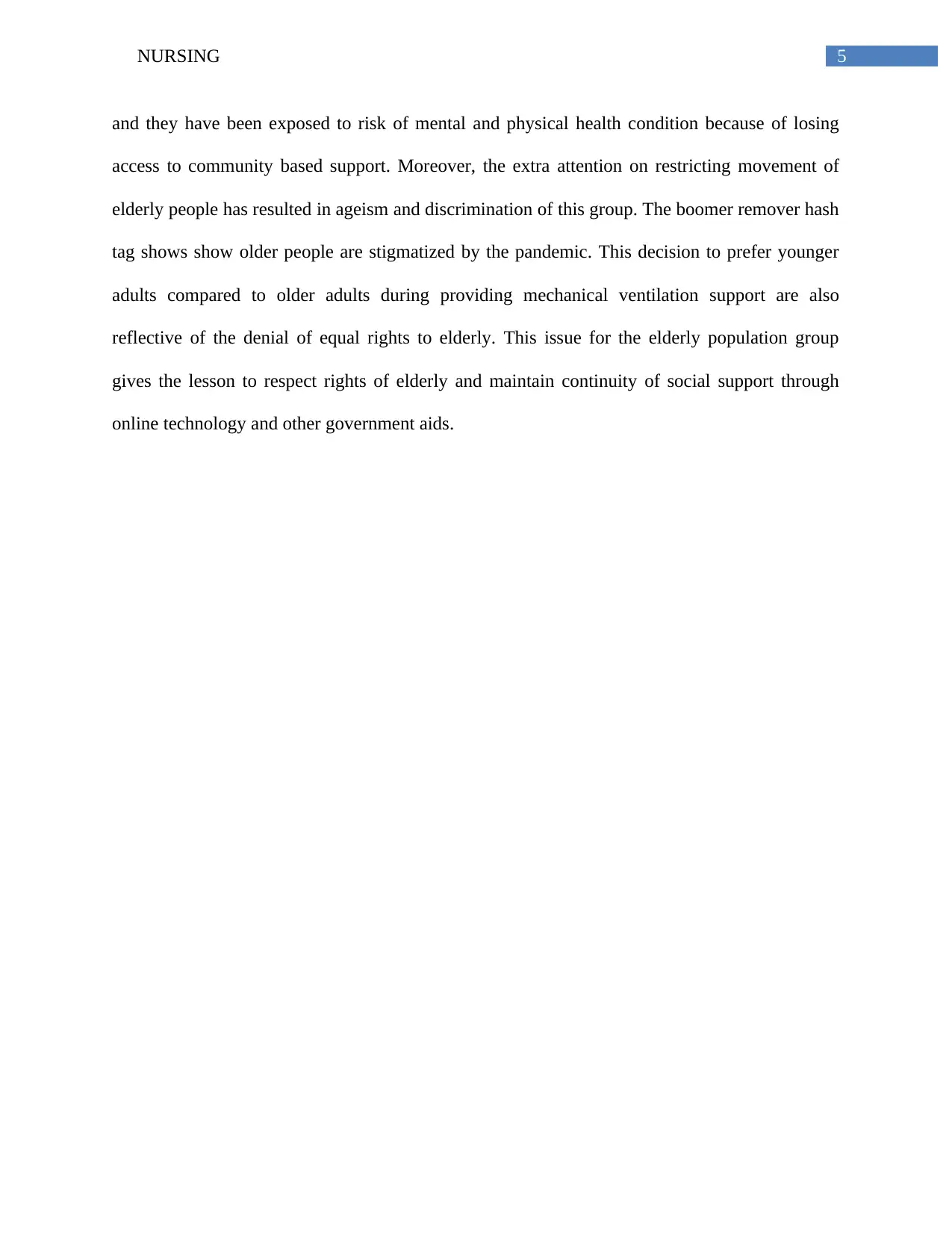
5NURSING
and they have been exposed to risk of mental and physical health condition because of losing
access to community based support. Moreover, the extra attention on restricting movement of
elderly people has resulted in ageism and discrimination of this group. The boomer remover hash
tag shows show older people are stigmatized by the pandemic. This decision to prefer younger
adults compared to older adults during providing mechanical ventilation support are also
reflective of the denial of equal rights to elderly. This issue for the elderly population group
gives the lesson to respect rights of elderly and maintain continuity of social support through
online technology and other government aids.
and they have been exposed to risk of mental and physical health condition because of losing
access to community based support. Moreover, the extra attention on restricting movement of
elderly people has resulted in ageism and discrimination of this group. The boomer remover hash
tag shows show older people are stigmatized by the pandemic. This decision to prefer younger
adults compared to older adults during providing mechanical ventilation support are also
reflective of the denial of equal rights to elderly. This issue for the elderly population group
gives the lesson to respect rights of elderly and maintain continuity of social support through
online technology and other government aids.
⊘ This is a preview!⊘
Do you want full access?
Subscribe today to unlock all pages.

Trusted by 1+ million students worldwide
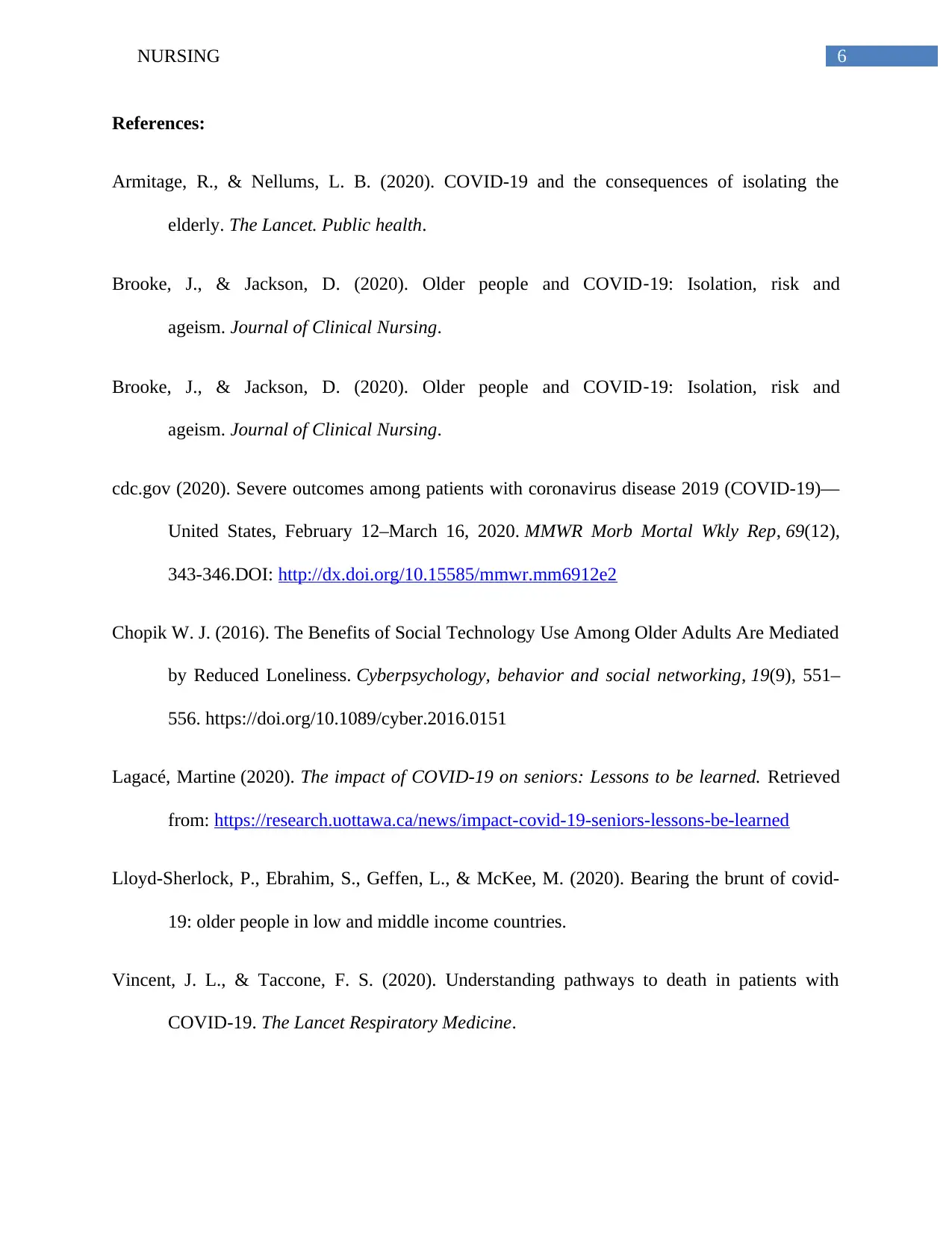
6NURSING
References:
Armitage, R., & Nellums, L. B. (2020). COVID-19 and the consequences of isolating the
elderly. The Lancet. Public health.
Brooke, J., & Jackson, D. (2020). Older people and COVID‐19: Isolation, risk and
ageism. Journal of Clinical Nursing.
Brooke, J., & Jackson, D. (2020). Older people and COVID‐19: Isolation, risk and
ageism. Journal of Clinical Nursing.
cdc.gov (2020). Severe outcomes among patients with coronavirus disease 2019 (COVID-19)—
United States, February 12–March 16, 2020. MMWR Morb Mortal Wkly Rep, 69(12),
343-346.DOI: http://dx.doi.org/10.15585/mmwr.mm6912e2
Chopik W. J. (2016). The Benefits of Social Technology Use Among Older Adults Are Mediated
by Reduced Loneliness. Cyberpsychology, behavior and social networking, 19(9), 551–
556. https://doi.org/10.1089/cyber.2016.0151
Lagacé, Martine (2020). The impact of COVID-19 on seniors: Lessons to be learned. Retrieved
from: https://research.uottawa.ca/news/impact-covid-19-seniors-lessons-be-learned
Lloyd-Sherlock, P., Ebrahim, S., Geffen, L., & McKee, M. (2020). Bearing the brunt of covid-
19: older people in low and middle income countries.
Vincent, J. L., & Taccone, F. S. (2020). Understanding pathways to death in patients with
COVID-19. The Lancet Respiratory Medicine.
References:
Armitage, R., & Nellums, L. B. (2020). COVID-19 and the consequences of isolating the
elderly. The Lancet. Public health.
Brooke, J., & Jackson, D. (2020). Older people and COVID‐19: Isolation, risk and
ageism. Journal of Clinical Nursing.
Brooke, J., & Jackson, D. (2020). Older people and COVID‐19: Isolation, risk and
ageism. Journal of Clinical Nursing.
cdc.gov (2020). Severe outcomes among patients with coronavirus disease 2019 (COVID-19)—
United States, February 12–March 16, 2020. MMWR Morb Mortal Wkly Rep, 69(12),
343-346.DOI: http://dx.doi.org/10.15585/mmwr.mm6912e2
Chopik W. J. (2016). The Benefits of Social Technology Use Among Older Adults Are Mediated
by Reduced Loneliness. Cyberpsychology, behavior and social networking, 19(9), 551–
556. https://doi.org/10.1089/cyber.2016.0151
Lagacé, Martine (2020). The impact of COVID-19 on seniors: Lessons to be learned. Retrieved
from: https://research.uottawa.ca/news/impact-covid-19-seniors-lessons-be-learned
Lloyd-Sherlock, P., Ebrahim, S., Geffen, L., & McKee, M. (2020). Bearing the brunt of covid-
19: older people in low and middle income countries.
Vincent, J. L., & Taccone, F. S. (2020). Understanding pathways to death in patients with
COVID-19. The Lancet Respiratory Medicine.
Paraphrase This Document
Need a fresh take? Get an instant paraphrase of this document with our AI Paraphraser
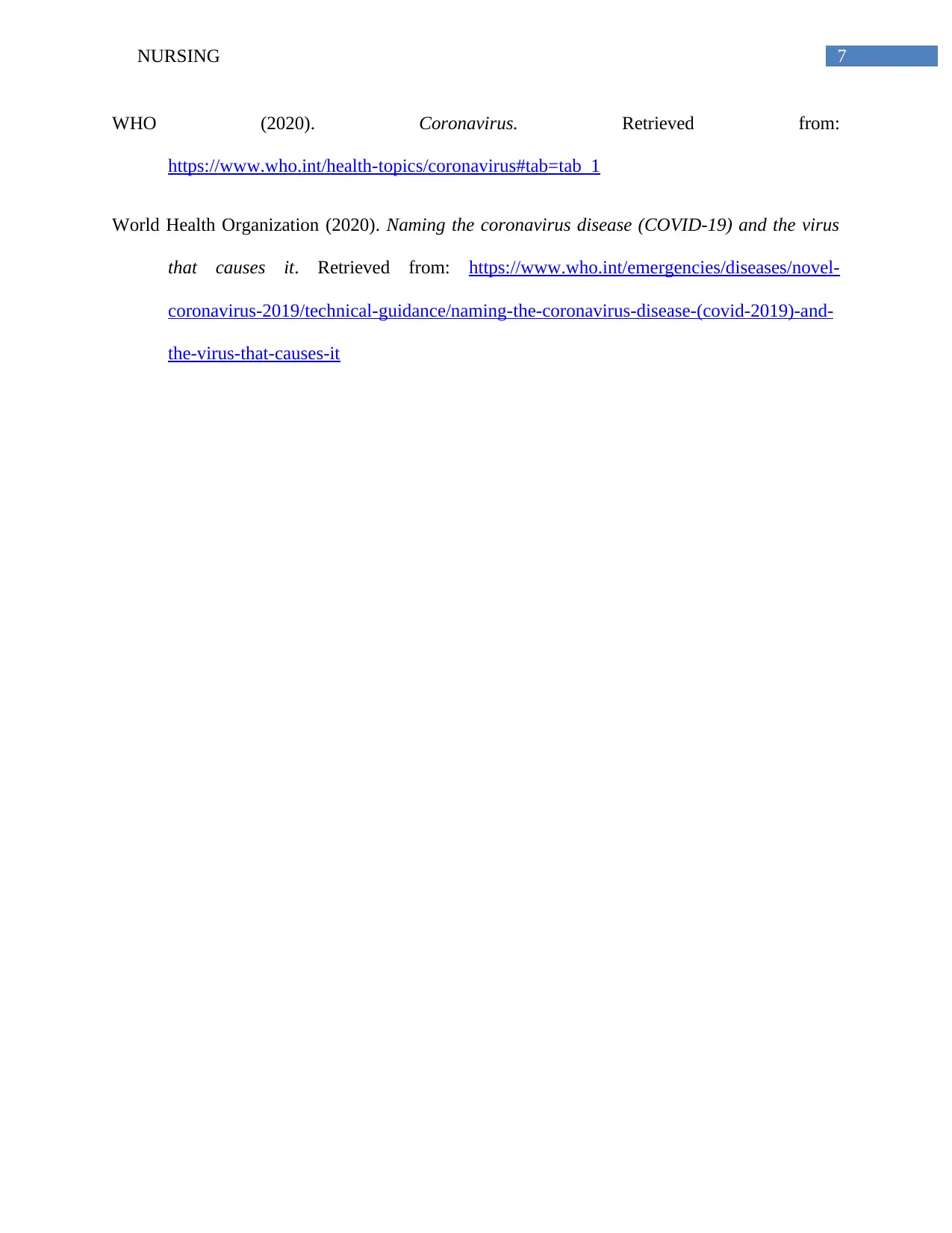
7NURSING
WHO (2020). Coronavirus. Retrieved from:
https://www.who.int/health-topics/coronavirus#tab=tab_1
World Health Organization (2020). Naming the coronavirus disease (COVID-19) and the virus
that causes it. Retrieved from: https://www.who.int/emergencies/diseases/novel-
coronavirus-2019/technical-guidance/naming-the-coronavirus-disease-(covid-2019)-and-
the-virus-that-causes-it
WHO (2020). Coronavirus. Retrieved from:
https://www.who.int/health-topics/coronavirus#tab=tab_1
World Health Organization (2020). Naming the coronavirus disease (COVID-19) and the virus
that causes it. Retrieved from: https://www.who.int/emergencies/diseases/novel-
coronavirus-2019/technical-guidance/naming-the-coronavirus-disease-(covid-2019)-and-
the-virus-that-causes-it
1 out of 8
Related Documents
Your All-in-One AI-Powered Toolkit for Academic Success.
+13062052269
info@desklib.com
Available 24*7 on WhatsApp / Email
![[object Object]](/_next/static/media/star-bottom.7253800d.svg)
Unlock your academic potential
Copyright © 2020–2025 A2Z Services. All Rights Reserved. Developed and managed by ZUCOL.





